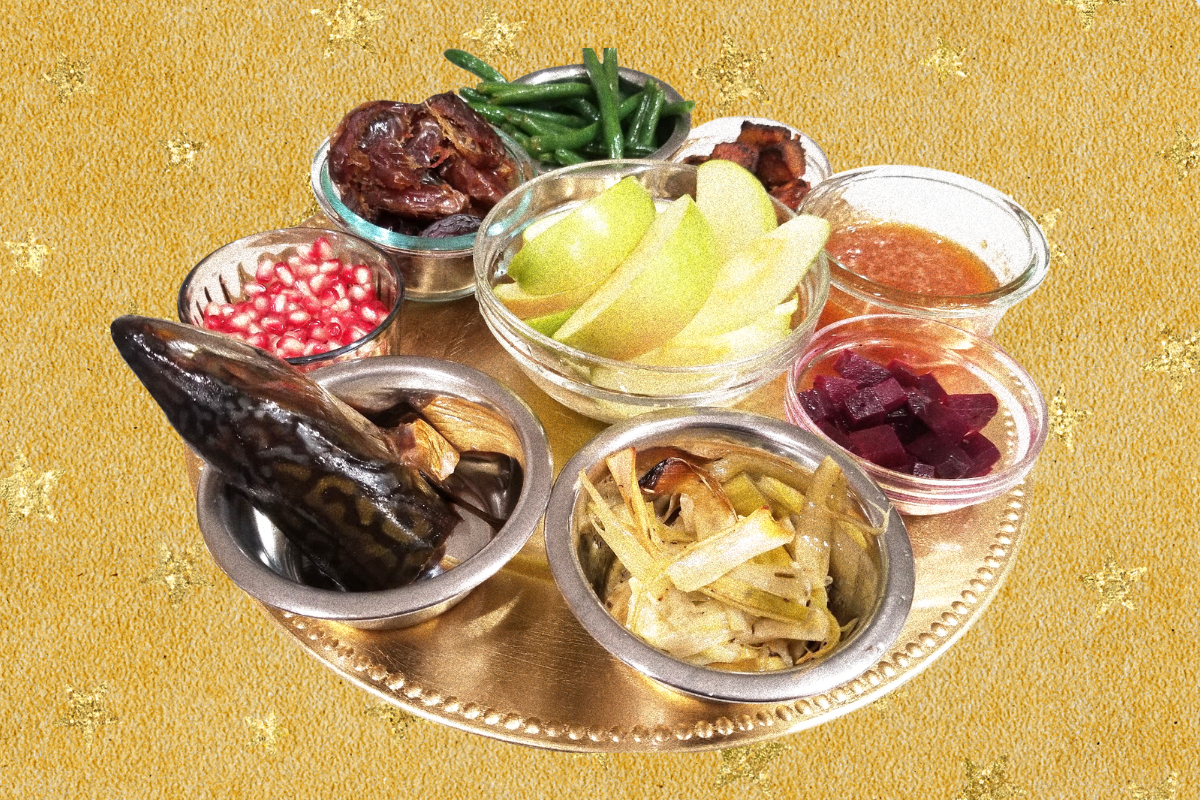Throughout my childhood, my extended family celebrated the eve of Rosh Hashanah with a seder in my grandparents’ London home: my parents, my siblings, all of our aunts, uncles, cousins and of course my beloved grandparents. It was a bittersweet time, as it marked the end of our summer in London with them, before they returned to their home in Bahrain.
This seder was not a new or unusual tradition, by any means. In fact, since the days of the Talmud, Sephardi and Mizrahi families have celebrated the first night of Rosh Hashanah with much more than apples dipped in honey. Abaye, one of the best known sages in Babylonia, suggested that at the beginning of each new year, we should eat foods that grow abundantly and symbolize health and prosperity. As such, each item on the seder plate represents a blessing or petition as we ask God to provide us with abundance, strength, health and peace for the coming year. The foods and their blessings were based on puns in Hebrew or Aramaic and related to the taste, shape, name or appearance of the food.
We would work our way through the foods in the seder, just as we did on Passover. Every year, we would start with rotub (dates in Baghdadi Judeo-Arabic). In preparation, my grandmother would carefully open each date, remove the seed and insert half a walnut inside before closing it up again, piling them on a tray. These rotub were not any old rotub. They were carefully sourced from all the many, many varieties of dates, in the same way that other families might choose a fine wine. There was always a discussion as to their provenance, their merits and how they compared to other dates. Some years my uncle Ritchie would come to London from Bahrain just before Rosh Hashanah and bring with him fresh Bahraini dates that were as precious as nuggets of gold. Other years, my father would be gifted Saudi Arabian dates by a Saudi friend who worked nearby. It was nice to have a Muslim neighbor bring us dates for our Rosh Hashanah table.
After admiring the rotub, we would eat them with a blessing: that there be an end to our enemies, those that hate us and who wish us harm. The blessing is based on a play on words with tamar (date in Hebrew) and tam (end). We could have sugar-coated this and seen it as a blessing for peace in the world, but for our family it was quite literal. We were asking for the demise of whoever the enemy of Israel and the Jews was at the time. Israeli politics and the fate of the Jews around the world was always the number one topic in my staunchly Zionist family so all the children understood exactly what the blessing was about.
Once we had finished with the dates, we got to enjoy the pomegranate. Pomegranates have grown in Israel for thousands of years, and whenever possible, our pomegranates would be imported from Israel. That way, we supported the Israeli economy and got to eat the sweetest pomegranates of all.
The number of seeds in a pomegranate are said to equal the number of mitzvot (good deeds) that we are commanded in the Torah. As such, the blessing on pomegranates asks that we be as full of good deeds as the pomegranate is full of seeds. But before we could even touch the ruby red pomegranate seeds or pick up a glass of my grandmother’s freshly squeezed pomegranate juice, we would receive a stark warning from our mothers and aunts: Pomegranate juice stains! If it were to come in contact with our new Rosh Hashanah clothing or the Persian carpet beneath our feet, we would surely be sorry. My Indian grandfather, however, was not concerned with such things. He would always focus on his own blessing, asking that the Jews be as numerous and as united as the seeds in a pomegranate.
Also on the table was an extra large fish head. All the cousins were both fascinated and terrified of the glassy eyes that stared back at us as we moved around the table. That is, until my uncle Robby scooped them out and chased us around the house with them as we laughed and screamed. The laughter and screaming would get louder as he pretended (I think!) to eat them.
The blessing said as we point to the fish head asks that we be at the head and not the tail. But my grandfather in his wisdom would wish what he always wished: that the Jewish people be fertile and multiply like fish. Nothing made him happier than Jewish children and babies! He would look at all his grandchildren with a big smile on his face and say “Mashalla!” (what God has willed) acknowledging his good fortune and expressing gratitude to God.
Such is the Jewish experience throughout history, that there always seems to be someone who doesn’t really like us. This reality is felt very deeply by Jews from Arab lands as we remember 850,000 of our people who were expelled from their homes throughout the Middle East and North Africa after the birth of Israel. And so, it should come as no surprise that we didn’t only have one food and accompanying blessing that dealt with wishing the downfall of our enemies. When we ate the leek or chives, the blessing said involved a play on words that comes from karti, which I’m guessing is leeks in Aramaic and is related to the word cut and we ask that our enemies be cut down. If you prefer a more positive spin, I guess you could see this one as a blessing for friendship, because no enemies means friendship, right? But again, this one was completely directed towards whoever was giving Israel or the Jewish people grief at the time, and sadly there is never a shortage.
I could go on… we had beets, zucchini, pumpkin, black-eyed beans and of course apples and honey. The blessing for green beans was based on the play on words with rubia (green beans) and yirbu (increase), asking that our merits increase. If our merits and with them our blessings increase, we must surely share this abundance with others. My grandfather could not bear the thought of anyone in the world going hungry. He believed very strongly in our responsibility to share our blessings with those who would otherwise go without, and he passed that belief down to his grandchildren and great grandchildren. I think that ties into the idea that it isn’t enough to simply eat a food, say a blessing and expect our wishes to come to fruition. What we are doing through this ritual is setting an intention that we will actively strive towards, in the hope that God will recognize our efforts and help us along the way. If we want a more equitable world, we need to share our blessings. If we want to be at the head and not the tail, we need to put in some effort. And if we want the Jewish people to be as numerous as the seeds in a pomegranate, well we all know what we need to do.
Every year, my husband and I host a large Rosh Hashanah seder in our home, just like those of my childhood. I tell the anecdotes that my grandfather used to tell. I remember the foods that my grandmother prepared so lovingly. And I even recall my dear uncle Robby and the fish eyes. We make known our intentions to work towards abundance, strength, health and peace, passing on the traditions and rituals of my family to our children. And I hope that one day they will remember our Rosh Hashanah seders with the same fondness with which I remember those of my childhood, and that they in turn will do the same with their children.



